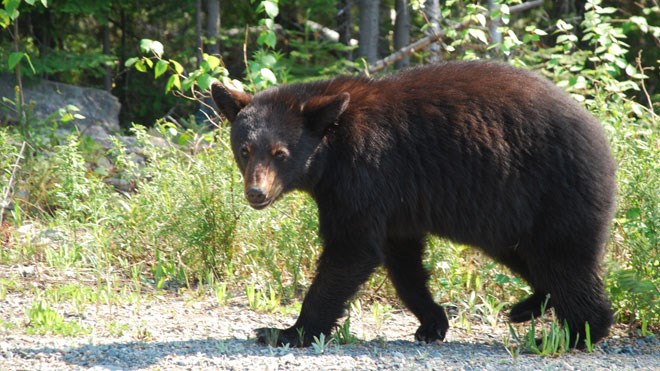When we look back on the summer of 2015, many of us will recall it as the season of the bear.
As city council was told last week, the city is No. 1 in the province when it comes to calls to the Ministry of Natural Resources and Forestry's (MNRF) Bear Wise hotline — making 1,300 of the 3,900 calls the hotline received since April this year.
Bears have kept the Greater Sudbury Police Service jumping, too. The service has received some 725 bear-related calls this season and had to send out officers to about 290 of them. In the last two years, GSPS has received some 1,261 bear calls.
It is wonderful that the bear population in Ontario is so healthy, we're sure most people would agree. We're also sure most people would just prefer to know that, rather than witness it first-hand by having daily visits from foraging bruins.
But for many Sudbury neighbourhoods that is exactly the issue — they can't help but witness it. On any given day this year, black bears wander the town like hungry restaurant-goers at a buffet, strolling up and down our streets, sampling morsels from garbage cans and bins.
As one MNR staffer told city council this week, Greater Sudbury is smack in the middle of an enormous blueberry patch, a staple of the black bear diet.
As it's been a terrible growing season for many things, blueberries included, the bears are starving. They want to eat; they want to feed their cubs — it's no wonder they're coming into town, our food waste is plentiful and often easy to get at.
The police and, in particular, the MNRF have taken the brunt of the criticism for the bear situation.
When it comes to the police, the killing of three bears didn't sit well with many members of the public. But having to shoot an animal that's just trying to get a bite to eat likely upsets the officers who had to do the killing just as much (if not more) as it does those of us who were so offended by it.
As Chief Paul Pedersen said last week, bear management is not the police service's core function. Officers are neither trained nor equipped to assess bear behaviour, trap or relocate an animal that's wandered where we prefer it didn't.
The MNRF is another matter. It used to be their role to ensure when wild animals wander into urban areas, said animal was trapped and relocated safely with minimal stress or harm. It was about keeping both the community and the animals safe.
But in 2012, the ministry scaled back its Bear Wise program from one that provides information, awareness and services to one that provides mostly information.
The MNRF still traps and relocates animals, but not to the same level as it once did. Conservation officers won't be dispatched outside business hours, for example.
If tranquilizer gun-toting conservation officers were still dispatched after dinner time, police officers wouldn't have had to shoot a hungry sow and cub in the South End last week.
By scaling back Bear Wise, the Ontario government has abdicated responsibility both to us, the taxpayer, and to the animals, which the MNRF has a duty to protect.
In a move that appears to be more propaganda than management, the province reinstated a limited spring bear hunt this year, ostensibly to see if it had an impact on so-called nuisance bears. The province knows full well it won't — the government's own data shows it won't.
That doesn’t let the public off the hook though because that garbage management issue is an important one. Even a fully funded Bear Wise program won't keep bears from coming into urban areas. The bears will come. They aren't stupid. If a bruin finds a reliable food source, it remembers it.
This means we, citizens, have as a much a role to play in bear management as do the police or the MNRF — we're in this together. Bear experts like Mike Commito tell us studies show the best way not to attract bears is to close the buffet by practising good garbage management.
This means purchasing bear-proof garbage cans and bins or putting cans in bear-proof containers, freezing odorous trash to minimize the smell and putting out trash the morning of collection instead of the night before.
These simple steps work. They might be a bit inconvenient, but are they more inconvenient than cleaning up the mess a bear has made of the garbage or worrying about coming face-to-face with a hungry bruin in the backyard?
It's also the neighbourly thing to do to protect bears and the public. Some jurisdictions mandate animal-proof containers for garbage. Others, like Timmins and Elliot Lake, have passed bylaws to enforce when garbage can be put at the curb.
Mayor Brian Bigger said last week this would be too difficult to enforce because bylaw officers only work during the day.
There's truth in that, but without legislation there's no recourse. It might be difficult to enforce, but it also provides a psychological impetus to change behaviour. Mandating animal-proof containers would be difficult to enforce as well, but also effective.
The point is, if all of us — citizens and government — took a little more responsibility, we could live a little more peacefully with our wild neighbours.
And we wouldn't have to worry so much about bears wandering into our backyards and then shooting them for doing so.
Join Sudbury.com+
- Messages
- Post a Listing
- Your Listings
- Your Profile
- Your Subscriptions
- Your Likes
- Your Business
- Support Local News
- Payment History
Sudbury.com+ members
Already a +member?
Not a +member?
Sign up for a Sudbury.com+ account for instant access to upcoming contests, local offers, auctions and so much more.
